One Small Step For Man – Apollo 11 Moon Landing 50th Anniversary – 5 Of The Best Space Exploration Movies
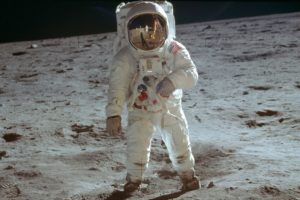
To mark the 50th anniversary of the Apollo 11 mission and the occasion of man’s first landing on the Moon, we consider the genre of space exploration in cinema and five of the very best films of this type. Astronauts Neil Armstrong, Buzz Aldrin and Michael Collins made history in July 1969 on their eight-day mission which literally took man further than he’d ever gone before. They also fulfilled a promise which had been made by President John F. Kennedy earlier that same decade when he vowed that the landing of a man on the Moon and his safe return to Earth would be a priority for the American administration which was still locked in the Space Race with the Soviet Union. The words uttered by Armstrong himself, as he stepped onto the surface of the Moon, perfectly captured the historical substance of the moment and it seems practically redundant to remind ourselves that the mission was the most-watched television event up to that point in time. Apollo 11 sparked the interest of all nations and, in the lofty words of an incumbent American President, caused the heavens to ‘become a part of man’s world.’ Bordering on the pompous you may well argue, but this has been a central premise of this type of cinema and, for that matter, much of science fiction generally – making sense of the unknown; putting a narrative structure on that which is unfamiliar and alien.
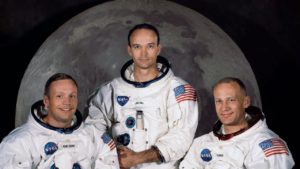
The science fiction genre is a very broad cinematic category and has been around long before 1969 and I do not propose to discuss its merits and very best examples within the narrow confines of this particular article. Suffice it to say that – in my humble estimation at least – the Apollo 11 mission has both influenced and, indeed, enhanced the genre generally and we have been privy to some very fine science fiction films over the last 50 years. Entries such as Blade Runner, the Alien series and, of course, the Star Wars saga might probably have come to pass in the absence of Apollo 11, but I would challenge anyone who would argue that the talents who realised these cinematic visions were not in some way affected by the seismic events of July 1969. Wasn’t it the case that film-makers such as Steven Spielberg and George Lucas were in their respective twenties at this time? A certain James Cameron was almost 15 years old on the 21st July, 1969 – the day when papers such as the New York Times and Washington Post heralded the achievements of Armstrong, Aldrin and Collins. Does anyone honestly believe such a moment was lost on them in terms of their subsequent ambition? Other movie-makers must have been similarly impressed. Just read about Alfonso Cuaron and his 2013 film Gravity in this very context below. In the wake of Apollo 11, technical advancement gathered pace in an unrelenting fashion and such progress had its effects on the film-making sphere as well. Nowadays we take steadicams and CGI effects for granted, but let’s remind ourselves that they were not available for such pre-Apollo 11 classics as 1951’s The Day the Earth Stood Still or 1956’s Forbidden Planet. 1968’s 2001: A Space Odyssey (as referenced under) was, of course, a game-changer in so many ways. Essentially a science fiction film, it is also one which considers the implications of space exploration; the particular emotions it can engender and the peculiar circumstances it can throw up for the individual. On an aesthetic level, Stanley Kubrick’s principal objective was to make the ‘proverbial really good science fiction movie.’ That he succeeded in this venture is beyond doubt, but my contention here is that he also offered us something of a cinematic dissertation on the evolution of man and the part space exploration has played in this. It’s perfectly captured in the famous scene in which a bone-club transforms into an orbiting satellite before our very eyes. This was a measure of Kubrick’s vision for mankind as he perceived it by the titular year 2001. The 1968 film – which featured a famously treacherous computer by the name of HAL – is included in my list of five below. Happy Apollo 11 anniversary to all mankind.
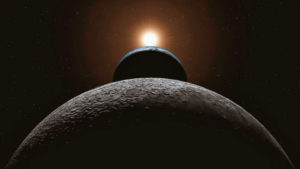
2001: A Space Odyssey (Stanley Kubrick 1968)
Released more than a year prior to the Apollo 11 mission, Kubrick’s epic science fiction film still remains one of the most influential in the genre and has been cited thus by many filmmakers including Steven Spielberg, George Lucas, Ridley Scott and Martin Scorsese. In terms of its meditation on the theme of space exploration, 2001 posits a general optimistic outlook I personally believe with respect to the advancement of mankind and the possibilities open to the human race in the future. Let’s recall that the director and his co-writer Arthur C. Clarke began working on their collaboration for this in the mid-1960s; the idea that a man would walk on the moon by the end of the decade was still a relatively tenuous one at that point in time. It still says much for Kubrick that his scientifically accurate visualisation of spaceflight is so on the money in this regard; the 205 special effects shots which he designed for the film earned him a fully-deserved Oscar for Best Visual Effects. Stand-out moments which linger after the credits have rolled include the rotating spacecraft and the zero-gravity effects as Dr. Heywood Floyd (William Sylvester) makes his way to the moon. The Star Gate sequence and the famous juxtaposition of the bone-club and the orbiting satellite have been mimicked on more than one occasion. The later drama, involving Discovery One and the on-board computer known simply as HAL, has not diminished with respect to its theme of the inherent dangers of technology. The film’s final image – in which Bowman (Keir Dullea) is transformed into a Star Child – was acknowledged by Kubrick as representing the next stage of human evolution. The classical music chosen by the director adds to the transcendental aura created by the visuals and the paramount themes. John Lennon – no less – suggested a near-religious experience when he proclaimed that the film ‘should be shown in a temple 24 hours a day.’ High praise indeed and still fitting some 51 years after its initial theatrical release.
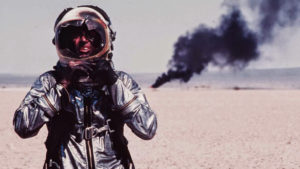
The Right Stuff (Philip Kaufman 1983)
An absolutely top-rate historical drama based on the best-selling Tom Wolfe novel of the same name and featuring a stellar cast which includes Ed Harris, Scott Glenn, Dennis Quaid, Fred Ward, Barbara Hershey and Sam Shepard. Beginning in 1947 with Chuck Yeager’s (Shepard) breaking of the sound barrier, The Right Stuff chronicles the early days of the Space Race in America and the inception of the Mercury Programme. Dramatising pivotal events such as Alan Shepard’s (Glenn) sub-orbital flight in 1961, and John Glenn’s (Harris) subsequent orbit of the Earth in 1962, the film successfully depicts the historical context of the endeavours of the men involved and the personal sacrifices they had to make along the way. Some three-and-a-half decades after its release, The Right Stuff still remains a marvellous cinematic study of this crucial phase for American space exploration with astute direction by Philip Kaufman and some fine performances by the cast, in particular Harris, Quaid and the Oscar-nominated Shepard. A winner of four Academy Awards in total (including Bill Conti’s memorable score), the film was a box office disappointment in its day, but its reputation has deservedly grown over the ensuing years. If you want to mark the Apollo 11 anniversary with a thrilling film, which approaches its subject matter with great intelligence and a fine smidgen of wit, then this is the one for you. The titular Right Stuff is well deserved.
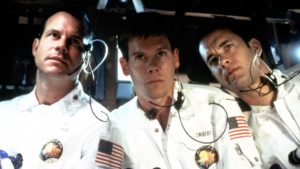
Apollo 13 (Ron Howard 1995)
Another terrific film in this particular genre which – in this particular instance – chronicles the aborted 1970 Apollo 13 lunar mission in which the planned Moon landing (the third of its kind in terms of history) dramatically became a desperate attempt to save the astronauts on board and return them home safely. Based on the book Lost Moon: The Perilous Voyage of Apollo 13 by astronaut Jim Lovell and Jeffrey Kluger, this 1995 drama is notable for its realistic depiction of events, the level of technical detail involved, the authentic period feel of the piece, the stellar direction of Howard and the excellent performances by the central cast members. Tom Hanks portrays Lovell and he is well supported by the late Bill Paxton and Kevin Bacon who play fellow astronauts Fred Haise and Jack Swigert respectively. Additional cast members include Gary Sinise, Kathleen Quinlan and Ed Harris who, of course, had previously appeared prominently in 1983’s The Right Stuff as John Glenn. For the purposes of accuracy, director Howard decided that every shot of the film would be original and no archival footage was utilised. The film’s tagline and most famous piece of dialogue – ‘Houston, we have a problem’ – currently ranks at number 50 on the American Film Institute’s 100 Greatest Movie Quotes Of All Time list, but, according to the actual mission transcript, these were not the exact words as uttered by Lovell. Nominated for a total of nine Academy Awards at the 68th ceremony (including Best Picture), Apollo 13 secured wins in the Best Film Editing and Best Sound categories, but lost out to Mel Gibson’s Braveheart. As cinematic representations of failed ventures go, this remains a powerful piece of film-making. No landing on the Moon on this particular occasion, but no less a film because of that.
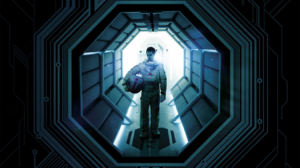
Moon (Duncan Jones 2009)
A thought-provoking and intense science fiction film, which also examines some of the personal and existential perplexities which may arise with space exploration, 2009’s Moon marked the feature debut of Duncan Jones whose real-life father David Bowie released his famous Space Oddity single a mere five days prior to the launch of the Apollo 11 mission. Sam Rockwell portrays Sam Bell, a contract worker who is stationed on the Moon to harvest the precious helium-3 for the Earth’s substantial energy requirements. Quickly approaching the end of his three-year stint, Sam looks forward to being reunited with his wife and the daughter he has never met; however, he is troubled by recurring dreams and hallucinations which suggest that his long-awaited return home might not occur as smoothly as he would hope for, if at all. A telling study on what it means to be human, as well as an exploration of the latent dangers of technology and the subservience of man to machine, Moon boasts a tour-de-force central performance from Rockwell, deft direction from Jones and an astute screenplay by Nathan Parker. At the time of its theatrical release, Jones referenced films such as Silent Running, Alien and Outland as his inspiration and there’s little doubt that Moon taps into some familiar themes of morality and the diminished role of mankind in the face of an overwhelming corporate entity. Benedict Wong co-stars as Thompson and Kevin Spacey provides the voice of Gerty – Sam’s robot companion and sole confidant. Irish actress Dominique McElligott appears briefly as Sam’s wife Tess.
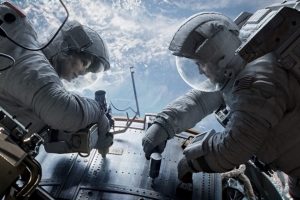
Gravity (Alfonso Cuaron 2013)
The vast domain and merciless environment that is space is to the fore in director Alfonso Cuaron’s Oscar-winning science fiction thriller which stars Sandra Bullock and George Clooney as astronauts who are stranded after the destruction of their space shuttle in mid orbit. Inspired by the 1969 Moon landing, and also heavily influenced by films in the genre, Cuaron had long been drawn to the idea of making a film about the exploration of the outer limits which he emphasised is primarily about the resilience of the human spirit in the face of seemingly inexorable adversity. In the central role of Dr. Ryan Stone, Sandra Bullock has never been better as a woman battling inhospitable conditions as she also comes to terms with a personal tragedy from her own past; George Clooney adds typically sterling support as Lieutenant Matt Kowalski, a veteran cosmonaut; the ubiquitous Ed Harris lends his voice as Mission Control in Houston, Texas. Essentially a story of survival set against the backdrop of the stars, Gravity deservedly garnered much critical praise on its release and won a host of awards including seven Academy Awards (Best Director, Best Cinematography and Best Visual Effects among them). Aliens and Avatar director James Cameron hailed its technical achievements as ‘the best space photography ever done…the best space film ever done.’ Buzz Aldrin commented in a similar vein as he described the visual effects as ‘remarkable.’ From a purely movie geek point of view, viewers might be interested to know that the climactic landing scene involving Bullock’s character was filmed at Lake Powell, Arizona – the same location where Charlton Heston and his unsuspecting companions touched down in 1968’s Planet of the Apes. An excellent entry in the genre which greatly benefits from the terrific performance of Bullock, the suspenseful storytelling powers of Cuaron and the remarkable visual effects. Space has seldom looked so beautiful and appeared so dangerous in equal measure.